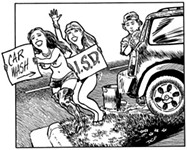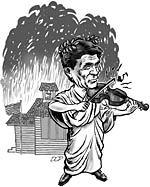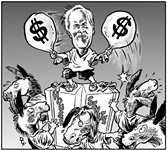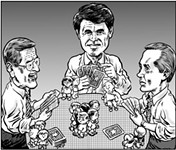What's So Special?
Will Perry's lege session come down to taxes vs. kids ... lose-lose?
By Michael King, Fri., April 23, 2004
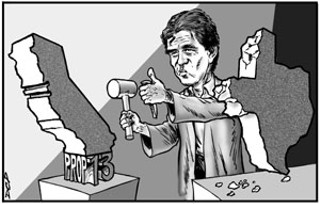
Whatever else happens over the next 30 days at the special legislative session on public school finance that opened this week at the Capitol, Texans should expect an education. Not necessarily about public schools and their needs and resources, but about the nature of political power and its exercise in Texas. Like it or not, we're about to receive a high-speed seminar.
Indeed, I'm already learning – edit that opening sentence to read, "the special legislative session on property-tax cuts." If you'll remember, the pressure has been building for action on public school finance for more than a year, as more and more school districts have hit the state-mandated property-tax cap of $1.50 (per $100 valuation) and wealthy districts are increasingly disturbed at having to send "their" property-tax dollars back to the state for redistribution to poorer districts, via the recapture system (disdained or praised as "Robin Hood").
Note that the primary complaint is not that property taxes are too high, but that some local communities – Highland Park, Plano, Richardson, even residentially wealthy Austin – cannot spend as much as they wish on their own schoolchildren. Indeed, the entire recapture system, installed in 1993 after much litigation and more consternation, is based on the symbiotic principal that the common public desire to fund education now links the wealthiest Texas communities with the poorest. A rising tide indeed lifts all boats – by law – although the courts have tolerated rather more inequity in water levels (unofficially estimated at as much as $1,000 per student) than most of us would find tolerable. Also driving the current schedule is a lawsuit against the system looming later this summer.
But in the last several weeks leading up to his special session proclamation, Gov. Rick Perry has steadily turned the emphasis from inadequate public school funding to the other half of the equation: "high" taxes. When they're trumpeting economic development, Texas pols never tire of bragging about the state's low tax burdens; when the subject is public services, the talk suddenly shifts to the unbearable load on Texas taxpayers.
Hijacked
Perry spent last week barnstorming the state to promote his Educational Excellence & Property Tax Relief plan, the highlight event being an April 15 (of course) rally on the Capitol steps featuring Houston talk-radio host Dan Patrick and his Citizens Lowering Our Unfair Taxes road show. Like a newly enrolled member of CLOUT, Perry delivered a three-finger salute (in honor of his proposed 3% annual appraisal cap) and bravely promised once again that there will never be an income tax on his watch. That the governor should feel it necessary even to mention the prospect may be a backhanded victory of sorts, but the chances of an income-tax bill reaching the floor of this Legislature are about the same as Osama bin Laden being named governor for a day.
It's one thing for the governor to grandstand on the South Steps, but his official session proclamation takes up many of the same demagogic themes. Despite a string of "whereases" devoted to "education [as] the foundation for the economic and cultural future of the state of Texas," the details of the call are largely devoted to lowering property taxes and finding theoretically painless substitutes – cigarettes, gambling, "adult entertainment," closing the corporate franchise loophole – and insinuating the prospect of permanently constricting the property-tax appraisal rate at both the state and local levels. Despite the noisy presence of the radio army – "Dan Patrick," commented one jaundiced Houston observer, "has never turned a single election in Harris County" – there is no real groundswell of support for any of these ideas.
Even while the governor was touring the state to promote his plan, local officials – many of them staunch conservatives – were reacting angrily to the proposed restrictions on appraisals as devastating to community services, and major business groups in Houston and Dallas were themselves lobbying editorial boards and the Lege in an attempt to promote new state funding for education. The Texas Municipal League was up in arms, and several North Texas mayors and county judges – not exactly notorious as a cabal of tax-and-spend liberals – wrote Perry that his proposal, "which mirrors some of the worst aspects of California's Proposition 13, does nothing to address school finance or adequacy." "Governor," the group concluded, "we do not want to become another California."
The opening gavel hasn't sounded, and the specter of California (and its tax-cap-devastated school system) is already hovering over the Capitol. Observers of all political stripes have questioned the governor's strategy in calling a special session in defiance of his own assurances that he would not do so unless there was a "consensus" on how to fix public school finance. What is not in doubt is that in the absence of that consensus, Perry has politically hijacked the school finance debate and turned the discussion over to property taxes and how best and how far to lower them. What's not yet clear is whether Perry can muster Lege allies in sufficient numbers to sustain that approach, let alone enact legislation to carry it out.
What's Possible
School advocacy groups and liberal Democrats are warning against a shell game that would short-circuit school finance in favor of property-tax cuts and privatization, while the governor's Republican colleagues – notably Lt. Gov. David Dewhurst, House Speaker Tom Craddick, and House Education Chair Kent Grusendorf – have declined to embrace Perry's "incremental" approach to tax cuts. All three have publicly recommended deeper cuts and shied from endorsing the governor's plan that proposes narrowly tailored substitute taxes – cigarettes, gambling, franchise, and accounting – to make up the difference (see "Naked City" for an update on this week's committee hearings and initial legislation). Dewhurst says his plan will be based on last year's Senate proposal, although most likely recommending a broad-based "business activity tax" instead of last spring's increase in the sales tax.
Legislators of both parties say they're skeptical that this early sound and fury will result in dramatic reform. Round Rock Republican Rep. Mike Krusee joined the governor at the CLOUT rally last week, but based on his experience in school finance debates – his first session was in 1993, for the inception of the current system – he doesn't anticipate great changes. "I think that until people gather at the Capitol and see plans on paper and get lobbied by all sides – the lobby, voters, citizens – legislators are not going to have a real idea of what's possible and what's not." He acknowledges that many of his GOP colleagues are calling for major tax cuts and the outright elimination of Robin Hood, but he expects that many will be changing their tune before long. "You've got Republicans going around saying, 'Let's end Robin Hood.' But 'Robin Hood' is just a euphemism for equity. Equity's here to stay, and any changes we make must make the system more equitable." Krusee notes that most of his colleagues have not experienced a public school finance session firsthand and "don't understand the pressures that come with it," so they are inclined to declare grand plans. "Right now's the time for dreams, and those are all being floated. But the reality I think is going to be much more moderate."
Virtually everyone is paying lip service to equity – it's not only the law, it's difficult politically to defend spending $1,000 more per year on one Texas school child than on another, cumulatively across whole districts, simply because of where those children happen to live. Wayne Pierce of the Equity Center, which advocates for the 85% of Texas school districts that benefit from the current recapture system, says he's troubled by the rhetorical eagerness to kill the goose that shares the state's golden eggs. "The current system has a lot to offer," Pierce said. "It would be good for Texans to back off this mass hysteria about ending Robin Hood and step back and look at what it really does. That is, it moves the resources from where they are in abundance, to where the children are in abundance, and I don't see anything wrong with that. The solutions we come up with may not do as well as what the current system does."
The governor insists that his plan, which would tax most business property statewide instead of locally, thereby brings 98% of Texas schoolchildren within the equity system – although Pierce and other analysts say the details they've seen thus far fail to confirm that. In exchange, they say, Perry's plan would create 12 to 20 "superwealthy" districts that rely largely on residential property wealth, allowing them to spend thousands more on their schools at a much lower tax rate than most of the state. Last week, Campaigns for People released an analysis showing that wealthy districts, which account for about 10% of Texas students, provide nearly 30% of political campaign contributions – perhaps not quite a quid pro quo, but a stark illustration of whose voices speak loudest at the Capitol. The issue is not just that cutting those folks loose from the recapture system creates superprivileged schools – it's also that it eliminates any self-interest those communities might have in improving the entire state school system, or in adding their considerable political influence to that long-term project.
Support for the governor's proposals on the revenue side is equally uncertain. What's been called the governor's "tassel tax" – a $5 minimum on admissions to adult or "nude entertainment" venues, which haven't featured "tassels" in decades – has earned the most sarcasm, but it shares with proposed cigarette taxes and expanded gambling ("video lotteries," i.e., slot machines at racetracks), a reliance on morally dubious means to unpredictable ends. Church groups are raising eyebrows, and the Center for Public Policy Priorities took a look at the governor's revenue proposals and concluded bluntly that they are "immoral, unstable, and diminishing." Dewhurst says he will propose a "business activity tax" that will allow property taxes to be cut in half – Perry says no such tax will ever reach his desk – and Arlington Rep. Grusendorf has filed a bill that would move all property-tax collection to the state. The grander plans all require one or more constitutional amendments (meaning two-thirds votes from House and Senate), and at the moment few see that as achievable.
Austin political consultant Bill Miller says frankly, "There is no consensus. ... I don't think they'll get anything through that requires a hundred votes [two-thirds in the House]. I've used this line before, but you couldn't get a hundred votes for Christmas right now." Miller considered it revealing that with the session only a few days away, Perry's bill still had no House sponsor. "It sounds like there's a bit of reluctance," he said with a laugh. "When you call a session and you have a bill, you want a strong, strong sponsor, somebody that knows how to pass legislation and count votes. Those are the requirements. ... The longer it takes, the harder it's going to get for him."
Austin Rep. Elliott Naishtat is similarly doubtful. "My expectations are very low," Naishtat said. "I see the governor's plan as a nonplan, which I don't see passing in this special session or any subsequent special sessions the governor might call. It certainly doesn't provide a reliable, long-term, stable tax base. It appears to be a patchwork, which will be opposed by many Democrats and Republicans and by many respected statewide organizations."
Sen. Eliot Shapleigh, D-El Paso, is promoting an income tax and says he intends to spend much of the next month traveling the state "building the coalition of the future." Shapleigh said he considers the session primarily a "great opportunity" to talk about "the need to build a quality education system, and the need to fund it." He's dismissive of the session prospects. "We have a governor who wants to shift the cost of education to a tassel tax; we have a lieutenant governor who wants to use consumption taxes and a business activity tax that behaves like a consumption tax to pay for it; we have a speaker who's wandering around hoping not to be indicted. There's no consensus at the top, middle, or bottom. I don't see any early solution to this. In the best of times, with clear leadership, it's a hard deal – now you have 30 freshmen running around saying, 'No new taxes.' What's a tax in that environment?"
Wild Cards
If there's little early consensus on the big issues – recapture and property taxes – is there anything else in the grab bag of education proposals that might get accomplished in a month? Waco Rep. Jim Dunnam, chair of the Democratic caucus, says that while Democrats have not been privy to most of the preparations, "Some people have been saying all along that this is just a bait and switch for policy changes that haven't passed the Legislature on their own." Both the governor's plan and Grusendorf's substitute bill lead with variations on the "performance incentives" fund that would provide $500 million in financial bonuses for high-scoring teachers and schools. Dunnam says he's heard talk from some Republicans that they'll be content if that's all they can pass, but he's not reassured.
"I'm not speaking for the caucus, just for myself," Dunnam said. "But to me, the performance incentives is one of the worst things [Perry's] doing. Teachers need to be paid fairly for their work, and not with this carrot-and-stick kind of deal. My feeling is, if we have that kind of money, we should take it and just put it into the [finance] formulas ... or use it just to lower the property-tax rates."
Other observers point to the various options listed in the reports from the interim education committees – vouchers ("freedom scholarships"), larger class sizes, making it easier to fire teachers, even eliminating the prevailing wage on school construction projects. "It's hard to imagine them bridging the gaps on the big issues," said Rick Levy of the AFL-CIO. "So I anticipate a bunch of mischief instead. I would expect we'll see vouchers, and 'merit-based pay' that will penalize poor districts even more, and undermining the prevailing wage for construction workers. I'm not very optimistic about anything very good happening." Levy is also wary of the reintroduction of more "tort reform" legislation, specifically addressing asbestos litigation, since the governor responded angrily when that move was blocked in the Senate last year. "I fully expect asbestos to arrive at some point," he said. "They haven't got the votes for it now, but there's no telling what will happen once the horse-trading starts."
On the other hand, advocates are hoping that Perry will drop his resistance – reiterated last week in an exchange with Comptroller Carole Keeton Strayhorn – to adding children's health insurance to the call. Naishtat says he will introduce a bill that would re-fund CHIP, for which federal money is already available, in the absence of action by the Republican-controlled Legislative Budget Board. He's not cheered by the prospect that the $1 cigarette tax he proposed last year for health and human services – blocked by the threat of a Perry veto – is now earmarked by the governor to help replace property taxes.
Austin Sen. Gonzalo Barrientos describes his own situation as difficult, because he supports funding equity but represents school districts defined as "rich" under the current system. "In Austin, our property taxes are sky-high, and we send $150 million elsewhere, and yet more than half of our students qualify for free or reduced lunches. Otherwise, it would be very easy for me to cast a vote – but it's going to be very difficult to do so and act on behalf of the kids and families here." He says he will support "anything that will reduce taxes overall and provide a stable, equal financing of our kids' education," but he's not optimistic. "I would guess we'll manage maybe another patchwork solution, with a few Band-Aids, to hold things together for a couple of more years, when another Legislature has to take up the responsibility."
Barrientos' attitude reflects that of many legislators – wanting to make changes that would put more money in public schools, but finding no politically actionable alternatives that would actually do the job. Mike Krusee describes the predicament of the Republican leadership. "As appealing as a property-tax cut is, it's like pushing down on one side of the balloon – the other side is going to go up. A large business tax is going to affect jobs [and] is fraught with peril for the state's economy."
Krusee looks back on a decade of school finance wars and says the only certainty for the special session is unpredictability. "In 1993, people would say, 'This is where I stand – I stand on principle.' They get three phone calls from superintendents back home, and they flip. No matter who you talk to, no matter what they say to you – it's gonna change." ![]()
Got something to say on the subject? Send a letter to the editor.





